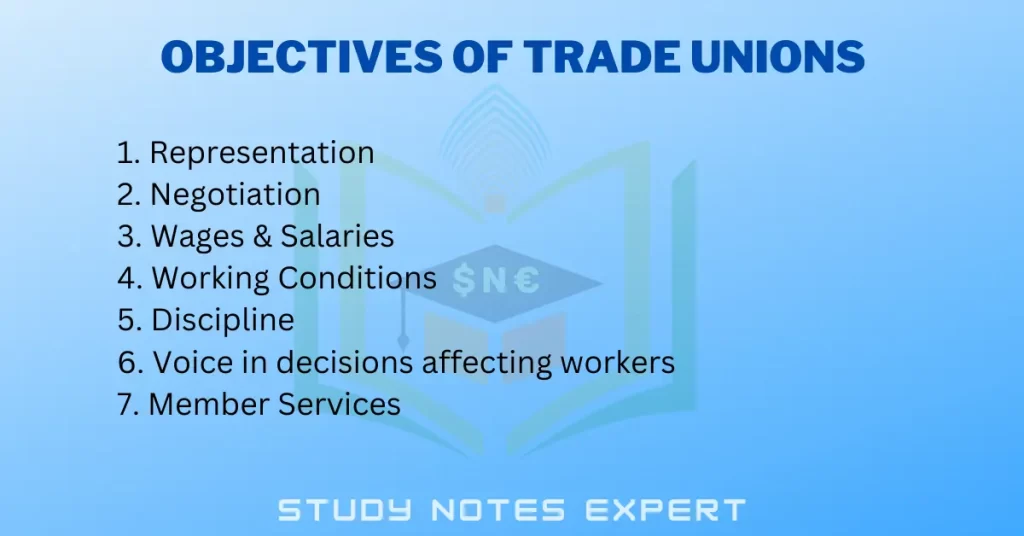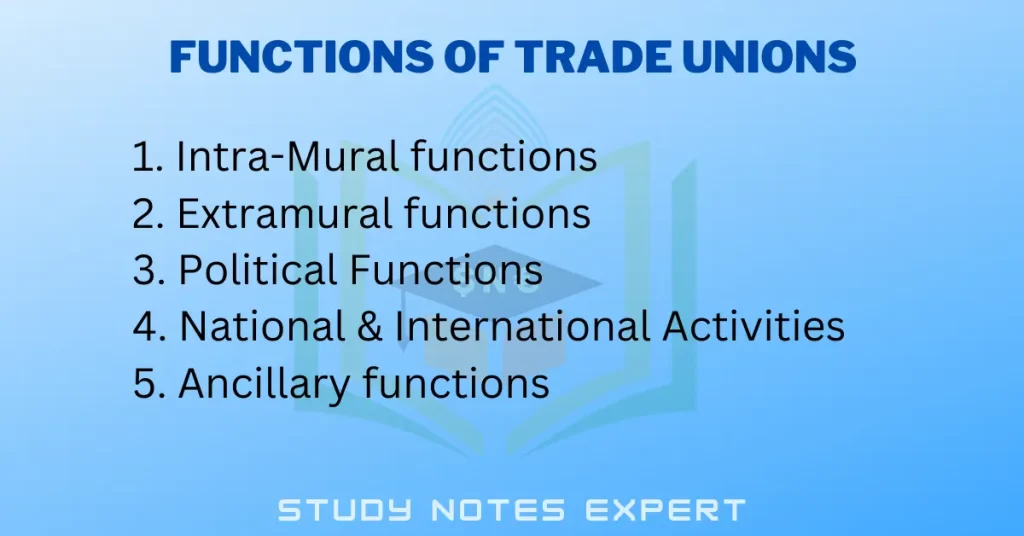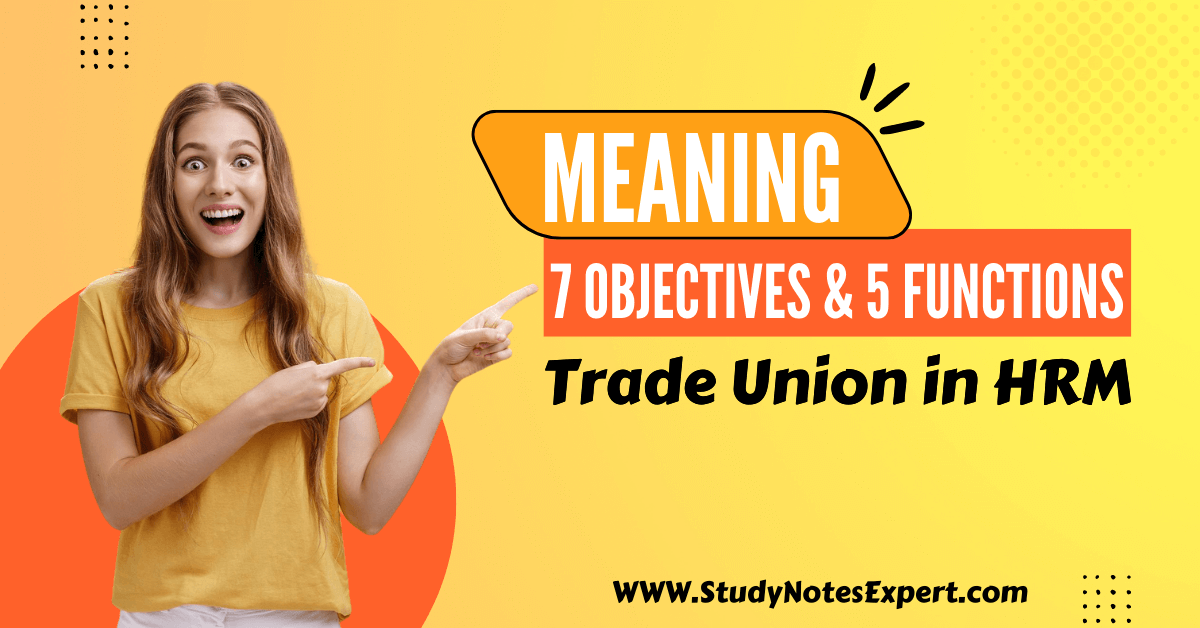Here we will give detailed information regarding trade union in HRM. Trade Union is the result of that philosophy of labor which says that “Union is Strength.” In the initial stages, different labor groups gradually formed organizations to improve their working conditions and economies, and these organizations became more and more effective and powerful with time.
A trade union may be a natural consequence of the modern industrial system because, during this period, there were many revolutionary changes in the traditional perspective between labor and capital.
Definition of Trade Union in HRM
A trade union is an organization of employees formed continuously to secure various benefits. A trade union in HRM is a continuous association of wage earners to maintain & improve the condition of their working lives.
According to Dale Yoder,” A trade union is a continuing, long-term association of employees, formed and maintained for the specific purpose of advancing and protecting the interest of members in their working relationships.”
Most Valuable 7 Objectives of Trade Unions
Their members form a trade union in HRM. Their primary function is to protect and promote the interests of primary function is to protect the interests of workers against discrimination and unfair trade practices. These are the main objectives of Trade Unions to achieve the following:

1. Representation
Trade union in HRM represent individual workers when they have problems at work. If an employee feels he is being unfairly treated, he can ask the union representative to help resolve the difficulty with the manager or employer. Unions also offer their members legal representation.
2. Negotiation
Negotiation is where union representatives discuss the issue affecting people working in the organization with management. There may be a difference of opinion between management and union members. Trade union in HRM negotiate with the employers to find a solution to these differences.
3. Wages & Salaries
The subject which drew the significant attention of the trade unions is Wage & Salaries. Of course, this item may be related to policy matters. However, differences may arise in the process of their implementation. In the case of the unorganized sector, the trade unions play a crucial role in bargaining the pay scale.
4. Working Conditions
Trade union in HRM, to safeguard the health of workers, demands the management provide basic facilities such as lighting and ventilation, sanitation, restrooms, and safety equipment. Also, while discharging hazardous duties, drinking, refreshment, minimum working hours, leave & rest, holidays with pay, job satisfaction, social security benefits & other welfare measures.
5. Discipline
Trade union human resource management not only conducts negotiations concerning items. It is concerned that employers will improve the working conditions. But also protects the workers from the clutches of management’s unilateral acts and disciplinary policies.
6. Voice in decisions affecting workers
The economic security of the employees is determined not only by the level of wages & duration of the employment. But also by the management’s personnel policies which include the selection of employees for layoffs, retrenchment, promotion, and transfer. These policies directly affect workers. The evaluation criteria for such divisions may not be fair. So, the intervention of unions in such decision-making is a way through which workers can have their say in the decision-making to safeguard their interests.
7. Member Services
During the last few years, trade union in human resource management have increased the range of services they offer their members. These include:
A.) Education & training
Most unions run training courses for their members on employment sights, health & safety, and other issues. Some unions also help members who have left school with little Education by offering courses on basic skills & courses leading to professional qualifications.
B.) Legal Assistance
As well as offering legal advice on employment issues, some unions help with personal matters like housing, wills, and debt.
C.) Financial Discounts
People can get discounts on mortgages, insurance, and loans from the unions.
D.) Welfare Benefits
One of the earliest functions of trade unions was to look after members who hit hard times. Some of the older associations offer financial help to their members when they are sick or unemployed.
Crucial 5 Functions of Trade Unions
Trade union in HRM perform various functions to achieve their objectives. These are working as a recent technique in HRM. The main tasks of modern trade unions are as follows:

1. Intra-Mural functions
These functions are also termed militant functions because unions may resort to strikes & other pressure tactics to implement their demands. The intramural function includes wage rise, proper working conditions, sanitation, safety, continuity in employment & so on. The union tries to resolve its issues through collective bargaining. Discussions and meetings do not help resolve union-wise strikes and other pressures as tools in getting these demands accepted. Thus, the militant functions of the trade union can be summed up as:
i) To raise the status as a part of the industry.
ii) To protect labor against victimization & injustice.
2. Extramural functions
Trade union in HRM also undertake tasks that are required for the welfare of their members. These functions include providing educational, recreational, and housing facilities. The unions raise funds through subscriptions from members and spend them for the welfare of workers. In case of untimely death, unions provide financial help to the deceased family members. Extramural functions are essential as they inculcate the spirit of cooperation among members.
3. Political Functions
Indian trade unions also play a vital role in the country’s political system. Trade unionism originated and developed or matured very much under the political scenario. They took the initiative to fast forward Indian polity and provided much-needed speed to it. It is the main function of Trade Unions in human resource management.
Thus, both are complementary to each other. They also form their parties and send their members to National Parliament or state assemblies by participating in general elections. In India, the contribution or role of trade unions remains very nominal. But still, the decision affected the formulation of labor policy and political aspirations of labor.
i) They also participate in consultation, committees & Institutions on behalf of employees.
ii) They make their members aware of the country’s political situations.
iii) They also encourage the employees for revolutionary and strategic activities.
4. National & International Activities
They also provide much-needed help to society during natural calamities, wars, etc., by mitigating national loss. They also cooperate in resolving different national serious problems. They protect their members’ interests as an international labor organization, World Labour Union Federation, & other international platforms. Trade unions provide much-needed help in times of strike and natural calamities in other countries.
5. Ancillary functions
The following are the main functions of Trade Union in HRM.
i) Performing the welfare functions for the moral up-gradation of employees.
ii) Establishing control over creating a particular industry by labor.
iii) Creating such morale and spirit among employees that they are not merely the tools of machinery but part and parcel of the organization.
iv) Securing fair wages, good working conditions, and better living conditions for employees.
v) Giving Recognition to them as equal partners in the industry by providing a good standard of living for them.
vi) Developing a sense of responsibility & discipline among them.
What is Trade Union in Human Resource Management?
A trade union is an organization that represents the collective interests of workers in a particular industry or sector. Trade unions negotiate with employers on behalf of their members on a variety of issues, including wages, working conditions, and benefits. Thereafter, joint management councils come into existence.
What are the 5 Functions of Trade Union?
The main functions of trade unions are as:
1. To represent and negotiate on behalf of workers with employers.
2. These will provide support and advice to members.
3. To offer training and development opportunities.
4. Lobby and campaign are organized on behalf of workers.
5. To provide financial protection for members.
What is the Impact of Trade Unions?
Trade unions can have a positive impact on society by improving worker safety, wages, and benefits. They can also help to protect workers from being taken advantage of by employers. However, trade unions can also have a negative impact, such as causing businesses to close down or preventing businesses from expanding. Workers participation in management is essential for trade unions.


Thank you for each of your efforts on this website. My niece delights in engaging in internet research and it is easy to understand why. We learn all concerning the compelling mode you give efficient thoughts by means of your web blog and improve response from other ones on the subject matter so my simple princess is being taught a lot of things. Have fun with the remaining portion of the year. You are always doing a glorious job.